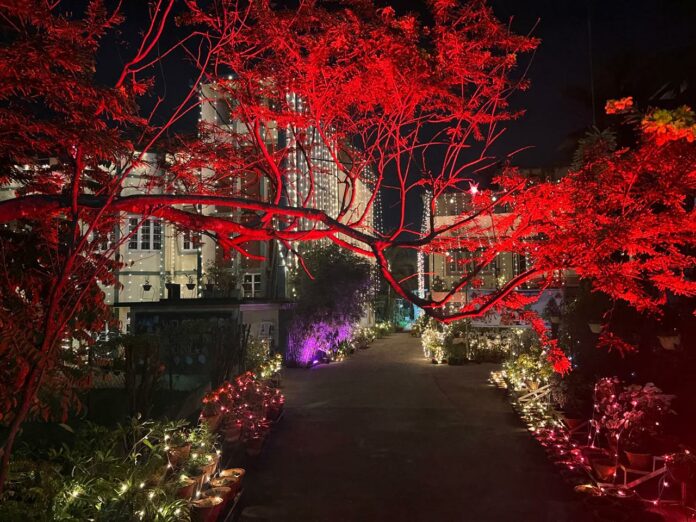Simona Choudhury
Diwali, an ancient and widely celebrated Hindu festival, embodies profound spiritual significance, observed through diverse narratives and rituals that collectively symbolize the triumph of righteousness. At its core, Diwali literally means row of lights,representing the victory of light over darkness, good over evil, knowledge over ignorance, and hope over despair. The most widely recounted story attributes the celebration to the return of Lord Rama to Ayodhya after his fourteen year exile and victory over the demon king Ravana with the citizens illuminating the path with lamps. Other significant narratives include the worship of the Goddess Lakshmi for prosperity, Goddess Kali for liberation and Lord Krishna’s defeat of the demon Narakasura. Because of these tales the celebration is considered as a time for spiritual reflection, family gatherings, joyous festivities, and the ushering of prosperity and new beginnings. Its origins are deeply rooted in ancient Hindu scriptures and traditions, evolving over millennia reflecting its organic growth within diverse cultural and religious practices across the Indian subcontinent.
Consequently, Diwali stands as a timeless observance, its enduring appeal derived from its universal message of renewal, virtue, and the eternal victory of benevolent forces.The tradition of bursting crackers during Diwali, while deeply rooted in cultural celebration, prompts critical examination regarding its profound environmental, animal, and human health ramifications. Environmentally, the combustion of fireworks releases a hazardous cocktail of particulate matter, sulphur dioxide, nitrogen oxides, and heavy metals into the atmosphere, significantly deteriorating air quality and contributing to smog and this was explained to me by an environmentalist.
Also Read: Bishnoi’s Ecological Crusade: Rooted in Courage, Blooming with Hope
From a human health perspective, these airborne pollutants exacerbate respiratory conditions such as asthma and bronchitis, impair cardiovascular health, and can cause temporary or permanent hearing loss, rendering the practice unhealthy. This was explained to me by a cardiologist. Animals get affected by the resultant noise pollution, reaching decibel levels far exceeding safe thresholds, inflicts acute stress, fear, and disorientation upon them, often leading to panic, injuries, and displacement. People with pets and animal lovers will understand this.
However , the untimely demise of Zubeen Garg born as Zibon Borthakur , a revered musical icon, has cast a profound shadow over the traditionally vibrant Diwali celebrations across Assam. This unfortunate incident is a tragic blow to the cultural landscape, deprived Assam of a truly benevolent and pure-hearted soul whose contributions deeply resonated with its people and consequently diminished the collective enthusiasm for the Festival of Lights and to burst firecrackers and indulge in fireworks.
It’s a personal choice to burst firecrackers and indulge in fireworks but there cannot be a ban on firecrackers because a potential prohibition of firecrackers presents a multifaceted challenge, primarily impacting the livelihoods of families sustained by their manufacture and raising significant concerns regarding the occupational health of the laborers involved. A ban would inevitably disrupt the economic stability of countless households, particularly in regions where firecracker production is a major industry, potentially leading to widespread unemployment and a lack of immediate alternative income sources for skilled and unskilled workers alike.
Concurrently, the process of manufacturing firecrackers and fireworks inherently exposes factory laborers to various health hazards, including prolonged contact with harmful chemicals such as heavy metals, sulfur, and potassium nitrate, as well as fine particulate matter, which can lead to respiratory ailments, skin irritations, auditory damage from noise exposure, and a heightened risk of accidents involving burns or explosions. Therefore, any policy consideration must delicately balance environmental and safety objectives with the imperative to address the socio-economic displacement of these families and mitigate the documented health risks faced by the workforce. Also Diwali do not prescribe or endorse gambling, card games like teen patti , drugs or alcohol consumption, The widespread adoption of these insignificant activities have emerged more as modern social customs, reflecting evolving leisure activities and celebratory trends, rather than being rooted in scriptural injunctions or centuries-old religious observances.
Also Read: Book Review: Life Is a Battlefield
Rather than engaging in the controversial debate regarding the use or prohibition of fireworks, or should there be raids in hotels and houses where these activities are held , it is vital to remember the true essence of Diwali. The festival’s profound significance lies in fostering community, illuminating homes with traditional lamps, lighting up your buildings and engaging in spiritual devotion through puja. Far beyond momentary pleasures , the celebration gains its true brilliance from the shared enjoyment of festive cuisine, donning vibrant traditional attire, and extending love and compassion to others. By actively seeking to uplift the lives of those less fortunate and cultivating an atmosphere of positivity and love, individuals can embody the festival’s inherent spirit of renewal and benevolence. Therefore, by embracing these meaningful practices and fostering a spirit of generosity and affection, one can truly make this Diwali a profoundly glowing and spiritually enriching occasion.

